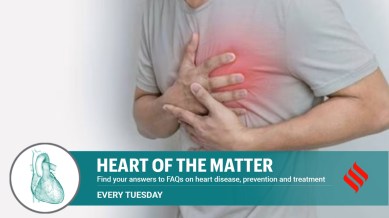Why does a heart attack happen at night? Here’s all you need to know
Dr Rajiv Bhagwat, interventional cardiologist, Nanavati Max Super Speciality Hospital, Mumbai, on risk factors for such silent episodes

Many patients ask me why heart attacks happen during sleep when the body is in a rested state. Truth is the body may not be at rest while sleeping or lying down, especially if you have co-morbidities like diabetes, obesity, high cholesterol and high blood pressure or an underlying condition like sleep apnea. Besides, very few understand that the chemical composition of the blood changes during sleep and may not be conducive for heart health.
WHAT HAPPENS TO THE BLOOD COMPOSITION?
monthly limit of free stories.
with an Express account.
Heart attacks at night usually take place after midnight and 4 am. This is the time when levels of a particular blood protein, called PA1, are the highest. This protein thickens the blood. Blood platelets then become sticky, leading to clot formation, which can cause a heart attack. Now if you already have risk factors, clotting could be that ultimate trigger.
IS SLEEP APNEA TO BLAME?
Sometimes we are unaware about the fact that we may have an underlying condition called sleep apnea. In this condition, all your muscles are relaxed, including those in the neck region, when you sleep. So your airway collapses, the passages constrict and the air you breathe in takes time to get to your lungs instead of moving freely. This will cause you to snore or even temporarily stop breathing while you sleep, leading to oxygen deprivation. Sometimes you stop breathing for 10 seconds or longer intermittently during sleep. This stresses out the heart. Your blood pressure, which usually falls at night, may actually rise and trigger a surge of stress hormones like cortisol and adrenaline. This puts increased stress on your heart because it has to work harder to normalise your blood pressure. Researchers have found that sleep apnea increases inflammation, changes the walls of blood vessels and causes abnormal heart rhythms, all of which can lead to heart attack and even sudden cardiac death.
THE RISK OF SUDDEN CARDIAC DEATH
Some patients may have a rare heart rhythm disorder called the sick sinus syndrome. This affects the heart’s natural pacemaker or the sinus node, which controls the heartbeat. Sick sinus syndrome causes slow heartbeats, pauses (long periods between heartbeats) or irregular heartbeats (arrhythmias). This is usually associated with a genetic abnormality that alters a protein involved in generating electrical activity in the heart.
Researchers found that a chemical present in the nervous system slows down the heart rate in healthy individuals. But in sick sinus syndrome patients, it may entirely prevent electrical activity spreading across the heart, triggering a sudden cardiac arrest.
ARE YOU AN INSOMNIAC?
Another cause is insomnia, which is linked to high blood pressure, sustained elevated levels of which are known to put pressure on the heart. A study in the journal Clinical Cardiology showed that people with insomnia are 1.69 times more likely to suffer a heart attack.
HOW CAN WE PREVENT HEART ATTACKS AT NIGHT?
The simplest way to do so is to keep a regular check on risk factors. If they exist, treat them with medication as well as lifestyle intervention (this means healthy eating, weight reduction, regular exercise, limiting alcohol and giving up smoking). Always have a good night’s sleep. And keep yourself hydrated before going to sleep.